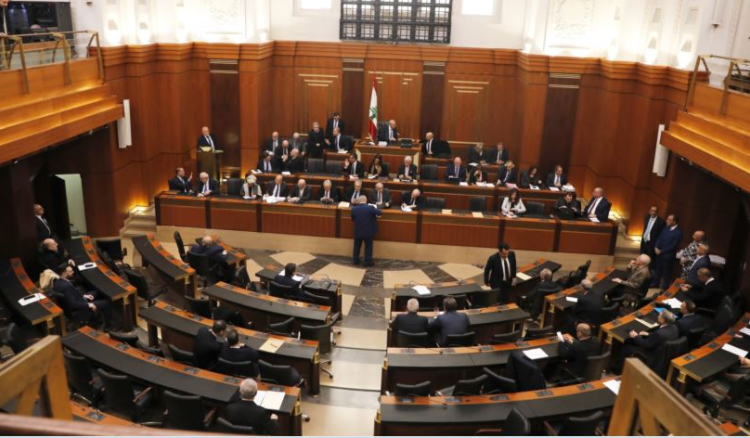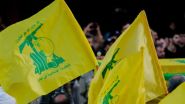
The parliamentary session that convened at 11 AM on Monday was adjourned prematurely, with only 9 of the 17 scheduled agenda items addressed.
The session was marred by political tensions, as several MPs withdrew in protest at the presidency’s refusal to include the issue of expatriate voting in the upcoming May 2026 legislative elections. Their withdrawal led to a lack of quorum, forcing the adjournment.
Parliament Speaker Nabih Berri announced that the session would resume on Tuesday at 11 AM to continue deliberations.
Only nine items were approved on Monday morning during what quickly became a fractious sitting, dominated by sharp political disputes. The debate was consumed by rows over expatriate voting rights and the recent Hezbollah light display projected onto the Raoucheh Rock in Beirut.
From the outset, diaspora voting dominated the discussion. Kataeb Party leader Samy Gemayel warned, “We are just weeks away from the registration deadline, and Lebanese abroad still don’t know on what basis they will be voting.”
Lebanese Forces (LF) MP Georges Adwan announced for his part that his bloc would suspend its participation in the electoral subcommittee tasked with reviewing proposals to amend the electoral law. Fellow LF MP Pierre Bou Assi described the failure to guarantee overseas voting rights as “a democratic crime,” condemning laws that are “impossible to implement” and risk undermining the elections. MP Ghassan Hasbani (LF) decried what he called the “unacceptable marginalization” of expatriates’ voices, accusing Hezbollah of fearing electoral competition from the diaspora.
Representing the Progressive Socialist Party (PSP), MP Hadi Abou el-Hosn called for the repeal of Article 112, arguing that expatriates should be allowed to vote for all 128 MP, while keeping the remainder of the law intact to prevent electoral disruption.
Despite the urgency of the matter, a draft law aiming to ensure that Lebanese abroad could vote for the full 128 MPs – backed mainly by the LF, Kataeb and PSP – was not included on the agenda.
Tensions escalated when MP Ali Hassan Khalil (Amal) accused the Lebanese Forces of seeking to “sabotage the elections.” His remarks were met with sarcastic applause from LF MPs, prompting a heated exchange during which cries of “respect yourselves” were hurled across the chamber. Khalil fired back, lamenting “the collapse of morality.”
As disorder mounted, Speaker Berri threatened to suspend the session altogether if “the chaos surrounding demands to amend the electoral law” continued. He ultimately drew a line under the debate and pressed on with the session’s original agenda.
Meanwhile, Minister of Interior Ahmad al-Hajjar reaffirmed that legislative elections would go ahead as planned in May 2026, in line with the current law. He reminded MPs that the deadline for expatriate voter registration is November 20.
The Raoucheh Rock Controversy
The session also opened against the backdrop of fresh controversy over last Thursday’s illumination of the iconic Pigeon Rock in Raoucheh. Images of former Hezbollah Secretary-General Hassan Nasrallah and his successor, Hashem Safieddine, were projected onto the landmark in commemoration of their assassination a year earlier, despite a ban issued by Beirut Governor Marwan Abboud and Prime Minister Nawaf Salam.
Media reports on Monday morning suggested Prime Minister Salam had considered boycotting the session over the matter.
In response to what he described as a clear breach of the ban, Salam ordered the Ministers of Interior, Defense and Justice to pursue those responsible. An investigation is now underway.
Minister of Interior Hajjar clarified that the original permit only authorized a small gathering, with no provision for illuminating the rock. However, the size of the crowd made it impossible for security forces to intervene, he said. The matter has now been handed over to the Internal Security Forces.
At the start of the session, MP Firas Hamdan denounced what he called an “unacceptable” smear campaign against Prime Minister Salam, who has been accused by Hezbollah supporters of “collaborating with the enemy” and harboring “Zionist” sympathies. “If this faction does not support the Prime Minister, then they should leave the government,” he said. “This rhetoric only serves to divide the country.”
Speaker Berri defended Salam, stating, “He is the Prime Minister of all Lebanon. The government does not belong to one or two parties.”
Despite the stormy proceedings, several key draft laws were passed, including: Decree No. 9109, authorizing the government to sign an agreement with the Arab Organization for Agricultural Development; amendments to the Currency and Credit Code, permitting the Banque du Liban to issue new LBP 500,000, LBP 1 million and LBP 5 million banknotes; Decree No. 936, which releases an additional LBP 2.35 billion under the 2025 budget to fund pensions, along with a LBP 12 million allocation for public sector retirees; and Decree No. 602, amending Law No. 42 of 2017 to update the legal framework governing public-private partnerships.
Aoun-Berry Meeting
After the session, Mr Berry met with President Joseph Aoun for a nearly half-hour discussion. The head of the legislature confirmed that they addressed a range of current issues during their talks. “He updated me on the outcomes of his meetings in New York, and we also brought him up to speed on the recent developments in Beirut,” he said, alluding to the Raoucheh incident.



Comments